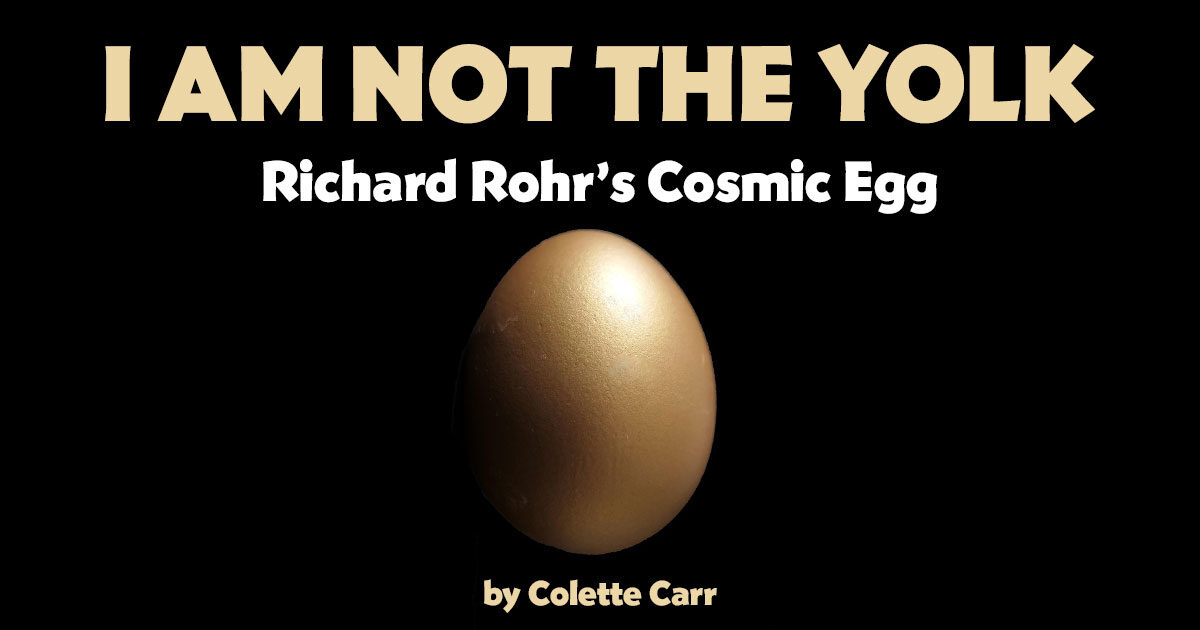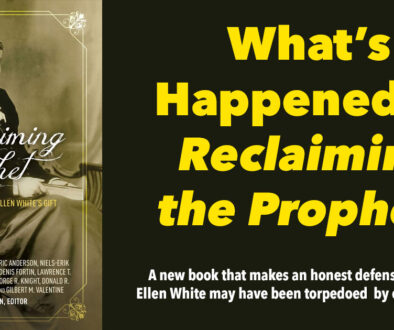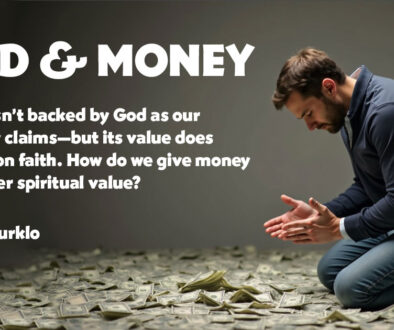The Lesson of Richard Rohr’s “Cosmic Egg”
by Colette Carr | 29 April 2025 |
 I am certain you know the feeling when reading something, you realize the author is clearly expressing what you have been thinking for a while. It is exciting and affirming. This is what happened to me when I came across the metaphor of The Cosmic Egg as shared by Richard Rohr. He describes this egg-shaped container which includes My Story, Our Story, Other Stories, and The Story.
I am certain you know the feeling when reading something, you realize the author is clearly expressing what you have been thinking for a while. It is exciting and affirming. This is what happened to me when I came across the metaphor of The Cosmic Egg as shared by Richard Rohr. He describes this egg-shaped container which includes My Story, Our Story, Other Stories, and The Story.
Indeed, I had no difficulty understanding his point: Born in an Adventist family, I grew to, simultaneously, love “Our story” and be frustrated by it, then became curious about the “Other stories” as I firmly stood inside “The Story.”
My story
This first dome contains my private life. “I” and my feelings and opinions are the reference point for everything. This dome is the little stage where I do my dance and where the questions are usually, “How do I feel? What do I believe? What makes me unique?”
These are our formative years when we try to figure out what we are all about and what makes us different. It is an important stage, for it will help us move around in society, aware of the gifts we can offer. The maxim “Know thyself” has been around for thousands of years for good reasons.
For example, I learned very soon that I was the enthusiast of the family, putting on shows, making jokes to diffuse tension, organizing games, gathering people, etc. I also learned that I was good at languages and performing arts, but that sports, math, and physics were not my cup of tea.
This knowledge is good, but it is not enough. Life is much more than my own personal story. Not everything revolves around me, and my point of view is just that, a view from a point. Richard Rohr explains:
My story isn’t big enough or true enough to create large or meaningful patterns by itself, but many people live their whole lives at this level of anecdote and nurtured self-image, without ever connecting with the larger domes of meaning. They are what they have done and what has been done to them—nothing more. This self becomes fragile and unprotected, and therefore constantly striving, easily offended, and fearful.
Our story
This second dome represents our family, our group, our church, our religion, our party, our country, etc. This is where we learn to interact with one another and grow as individuals living in community. Hopefully, it is a safe place, and a space where we are accepted, encouraged, and loved. There, we are confronted with people who are different than us, but not too much. We have a lot in common, and we feel understood. In this space, I am not perfect, those around me are not perfect, but they are my people.
Interestingly, Rohr notices:
Regrettably, a lot of people stop at the level of this shared meaning because it gives more consolation and security to the small self. In fact, loyalties at this level have driven most of human history up to now.
The dome of “our story” is hard to breach because it is where we can clearly define who is “us” and who is “them.” We tend to stay there because we feel comfortable within the walls of our sheep pen.
In my life, “our story” is represented by my family and the Adventist church. I am deeply grateful for the story I got to grow up in. I was part of a big family, and when I started to travel, I understood it was larger than I thought, and quite precious. I belonged there, developed my talents there, and thrived.
It is also under this dome that I lived through my biggest heartaches, but where I also experienced my most beautiful God encounters. These experiences were so deeply personal, moving, and awe-inspiring, I had no doubt God was with me, and by extension, with my church. I was in the right church.
Other stories
The third dome of meaning is what I call other stories. The term “other stories” illustrates the significant but sometimes painful recognition that our story is not the only frame, not likely the most important frame, and maybe even a frame with a lot of shadow and bias. […] As we encounter more and more of the world’s other stories, many people are broadening their wisdom, while others are broadening their fear. There is only one thing more dangerous than the individual ego of my story and that’s the group ego that insists that our story is the measure of all things and so seeks to label other stories as ignorant, dangerous, or inferior.
It is in the past ten years that I was more exposed to, but also more interested in, the stories of others. Maybe it started with a little Argentinian girl. I had just watched the moving documentary by Pascal Plisson called On the Way to School.
One of the featured characters is Carlos. He lives with his family in the remote Patagonian region. And he has a little sister. Carlos travels long distances on horseback to get to school, his sister Micaela behind him. At some point on the journey, Carlos makes his horse stop by an altar – a few stones erected in the middle of nowhere, decorated with colorful ribbons. It shelters a small statue. The children get off the horse, and little Micaela kneels in front of the altar. She doesn’t pay attention to the wind playing with her hair; her dark eyes are focused on the small statue. Her lips move slightly. What is she sharing? Who is she praying for?
I am just another human being, but in this quiet moment, I saw her faith, and it touched me. I thought about this scene many times, and I still can’t imagine my heart melting while God’s heart stays cold because she was praying to a statue. A big no-no in my church.
Do you and I think we worship and pray in a perfect way? I don’t think so. We count on God’s grace to make up for our shortcomings. So why would we think God doesn’t extend this same grace to others?
Then, as I read many books and articles written by authors issued from different denominations (some would say that’s where the problem lies, but please, keep reading), I was amazed to see how their experience in their church and my experience in my church were profoundly similar. This happened so often that I had to admit, “Well, it seems that we are not that ‘peculiar.’” If we look outside our walls, we may find out that people, over there, have the same kind of struggles, the same kind of loving fellowship, the same kind of questions, and the same kind of hope. We may discover that the Shepherd’s sheep pen is much bigger than we thought, and that many of those we thought of as lost sheep are already in.
Growing up in the Adventist church, I experienced beautiful God moments. They were true and precious. I was in the “right” church in the sense that it was the one I found on my path, and I met God there. I know now that many other Love seekers, because of where they were born or because of their life journey, experienced these same precious encounters in a totally different context. The Spirit of God does blow where it will.
What do you make of this quote from Gotthold Ephraim Lessing (The Education of the Human Race)?
Every little sect or religion carries within it, no doubt, a grain of truth which makes it fit to serve the great design of the fertilization of the world – but as long as the wise men of each sect or religion take themselves for the cherished children of the divine Father who gratifies them with a favor which he refuses to the rest of humanity, the fullness of the idea of God will not be attained by any of them.
He wrote that in the 1700s! Are we finally able to recognize that he is right? Are we, at last, ready to acknowledge that yes, God inspired our movement and guided us, but neither more nor less than any other men and women of good will who found themselves on a different path?
The story
Finally, all of our stories – mine, ours, and theirs – are included in the encompassing story of God’s love and plan for humanity. In Rohr’s words:
The fourth dome of meaning, which encloses and regulates the three smaller ones, is called the story. By this, I mean the patterns that are always true. This is much larger and more shared than any one religion or denomination. […] For example, forgiveness always heals; it does not matter whether we are Hindu, Buddhist, Christian, or Jewish. […] Also, there is no specifically Christian way to feed the hungry or to steward the earth. Love is love, even if the motivation might be different.
Jesus said, “By this everyone will know that you are my disciples, if you love one another” (John 13.35). So, when a Catholic, a Buddhist, and an Adventist truly love, doesn’t it mean that they are, in the most profound way, Jesus’s followers? Or is it still as shocking to say this today as it was for Jesus’s contemporaries to hear him declare, not very subtly, that a Samaritan was closer to God’s heart than the religious leaders?
We all understand that our lives are tremendously influenced by where we are born, within which culture, country, religion, and family. This is so random, and largely unfair. I can’t imagine it would be the same regarding our capacity to be close to God. Depending on the reality of where we are born, God comes to us… or hides his face? Listens to our prayers… or ignores them? Welcomes the cries of our hearts… or plugs his ears? Thank God, we can read:
Blessed are the pure in heart, for they will see God (Matthew 5.8).
I desire mercy, not sacrifice (Matthew 9.13).
Man looks at the outward appearance, but the Lord looks at the heart (1 Samuel 16.7).
When people, over the face of the earth, whatever their set of beliefs, culture and practices, are peacemakers, humble, loving and kind, aren’t they bearing the fruit of the Spirit?
When Jesus prays “May they be one,” who is he talking about? Those belonging to the Adventist church? All Christians? Or all those willing to do his good work; even including the son who after saying “no” to his father decides to go and do the work anyway?
No, we are not the yolk of the egg. But I am, we are, and they are, included in The Story as it is told by a God whose ways are higher than our ways. I find this grounding, comforting, full of reasonable sense and profoundly just. I don’t need to disown my roots. I don’t need to despise the roots of others. I just need to acknowledge in awe and gratitude that God is capable of including and redeeming all of our stories.

Colette Carr writes from Anchorage, where she enjoys the many faces of Alaska. Among many other creative and educational activities, she translates articles from English to French for Adventist Today
She has a special request: would you share this link with all French-speaking people you know? We would love to grow the group of our French readers. Merci!
To comment, click/tap here.




